
President Joe Biden’s ambitious antitrust agenda faces a significant hurdle as Congress moves to slash funding for the Department of Justice Antitrust Division. This development comes just days after Biden previewed his plans to tackle economic issues, including lowering prices and increasing market competition, during his upcoming State of the Union address.
The Antitrust Division has been a central player in the Biden administration’s efforts to combat monopolistic practices and ensure fair competition in the market. However, the agency’s ability to carry out this critical work is now in jeopardy due to proposed budget cuts totaling $45 million reported Yahoo News.
The cuts are part of a larger consolidated budget bill containing six separate appropriation bills. Despite the House’s passage of the legislation on Wednesday, the bill’s fate now rests with the Senate. If approved, the Antitrust Division would face the challenge of fulfilling its mandate with reduced resources, potentially hampering its ability to enforce antitrust laws effectively.
President Biden, in announcing plans to combat unfair pricing and illegal practices, emphasized the importance of enforcing the law. However, with dwindling resources, the Antitrust Division may struggle to take on additional responsibilities, including leading a strike force alongside the Federal Trade Commission.
Related: Biden Administration Proposes $63 Million Boost for DOJ Antitrust Division
The budget cuts effectively undermine a bipartisan law enacted in 2022, which aimed to bolster the Antitrust Division’s resources by increasing filing fees for corporations seeking merger authorization. The Merger Fee Modernization Act was intended to provide additional funding for antitrust enforcement, but the budget bill imposes a $233 million cap on funding for the Antitrust Division, falling short of the projected $278 million needed for the next fiscal year.
These cuts have drawn criticism from various quarters, with experts warning that they could weaken the government’s ability to rein in corporate power and protect consumers. Matt Stoller of the American Economic Liberties Project and The American Prospect were among the first to report on the implications of the budget cuts.
As the debate over government funding intensifies, the fate of Biden’s antitrust agenda hangs in the balance. With the Senate set to review the budget bill, stakeholders await a decision that could have far-reaching implications for competition and consumer welfare in the United States.
Source: AU News Yahoo
Featured News
Big Tech Braces for Potential Changes Under a Second Trump Presidency
Nov 6, 2024 by
CPI
Trump’s Potential Shift in US Antitrust Policy Raises Questions for Big Tech and Mergers
Nov 6, 2024 by
CPI
EU Set to Fine Apple in First Major Enforcement of Digital Markets Act
Nov 5, 2024 by
CPI
Six Indicted in Federal Bid-Rigging Schemes Involving Government IT Contracts
Nov 5, 2024 by
CPI
Ireland Secures First €3 Billion Apple Tax Payment, Boosting Exchequer Funds
Nov 5, 2024 by
CPI
Antitrust Mix by CPI
Antitrust Chronicle® – Remedies Revisited
Oct 30, 2024 by
CPI
Fixing the Fix: Updating Policy on Merger Remedies
Oct 30, 2024 by
CPI
Methodology Matters: The 2017 FTC Remedies Study
Oct 30, 2024 by
CPI
U.S. v. AT&T: Five Lessons for Vertical Merger Enforcement
Oct 30, 2024 by
CPI
The Search for Antitrust Remedies in Tech Leads Beyond Antitrust
Oct 30, 2024 by
CPI